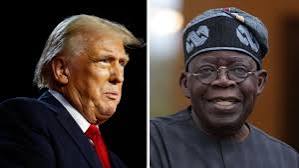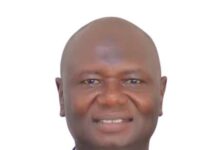By NIyi JACOBS
Donald Trump’s re-election has triggered mixed reactions across Africa, especially in Nigeria. While some anticipate stronger U.S.-Africa economic ties, others fear a revival of restrictive immigration policies that could hinder Nigerians’ educational, economic, and travel prospects in America. As his administration prepares, Nigerians weigh potential challenges and benefits.
With Donald Trump securing a second term as president, there is anticipation and concern among African leaders and citizens alike. For Nigeria, the implications are both promising and worrisome. On one hand, there is hope for strengthened economic ties between the U.S. and Africa, potentially boosting trade and investment in sectors that could fuel growth across the continent. On the other hand, Trump’s return may signal a revival of the restrictive immigration policies that affected many Nigerians during his first term. From education and migration to remittances and economic cooperation, Nigerians face a complex landscape of potential changes and challenges. Here’s a closer look at how Trump’s second term could shape Nigeria’s future.
1. Impact on Migration and Visa Access
Trump’s immigration policies during his first term included a travel ban affecting multiple nations, including Nigeria. Ostensibly for national security reasons, the ban led to extensive delays for Nigerians seeking to work, study, or reunite with family in the U.S. Visa processing times increased dramatically, creating a backlog that continues to affect applicants today.
Olumide Ohunayo, General Secretary of the Aviation Safety Round Table Initiative (ART), warns that a reimplementation of Trump’s prior policies could exacerbate these issues. “If you remember, Trump’s initial immigration policy led to severe processing delays, which we are still dealing with today,” he notes. The backlog means that some Nigerians seeking a visa now may not secure an interview slot for two to three years unless they are diplomats or government officials. With the potential return of these policies in January, the waiting period may grow even longer.
These delays could be particularly discouraging for Nigerians who have won the green card lottery, as they might face additional hurdles or be dissuaded altogether. Ohunayo also raises concerns about students and professionals who may opt to seek opportunities in countries with fewer immigration restrictions, thereby affecting Nigeria’s academic and professional engagement with the U.S.
2. Educational Opportunities: Will Nigerian Students Be Affected?
For Nigerian students, Trump’s policies may not pose as significant a barrier as for other categories of immigrants. Aviation expert Bernard Bankole suggests that Trump’s focus will likely remain on reducing illegal immigration rather than restricting visas for students who follow proper procedures and contribute positively. “As long as students pay their fees and abide by the laws, they shouldn’t worry,” Bankole states.
Nevertheless, the impact of Trump’s immigration policies on the perception of the U.S. as a study destination remains a concern. Many students might look elsewhere, especially if visa applications become more burdensome. In the long term, this shift could impact the number of Nigerian students choosing U.S. universities, potentially decreasing the intellectual and cultural exchange between the two nations.
3. Economic Implications: Remittances and Trade Relations
Remittances from Nigerians in the diaspora play a vital role in Nigeria’s economy, contributing over $20 billion annually. These funds are a crucial source of foreign exchange and support numerous households. However, should Trump reintroduce travel restrictions or tighten migration policies, the flow of remittances could be affected. Limited travel access would reduce Nigerians’ ability to send money home, placing additional strain on an economy already grappling with foreign exchange shortages and inflation.
Furthermore, Trump’s “America First” approach focuses on U.S. economic gains, often at the expense of other nations’ interests. This approach could lead to policy decisions that impact trade with Nigeria, particularly if tariffs or restrictions are implemented on goods coming from Africa. However, Bankole notes that a stronger U.S. economy might still indirectly benefit Nigeria if it creates opportunities for trade expansion, especially in key sectors such as agriculture, technology, and energy.
4. Repercussions on U.S.-Nigeria Relations
Despite the challenges, there is hope among Nigerian analysts and business leaders that Trump’s administration could bring renewed focus to U.S.-Africa relations. His re-election may push for bilateral trade agreements or encourage U.S. businesses to invest in Africa’s growing markets. According to Bankole, “The U.S. remains a significant global economic force, and any economic improvements in the U.S. could create ripple effects that benefit Nigeria and other African countries.”
Bankole also highlights that Nigerian policymakers should look beyond sentiment and focus on forging pragmatic alliances that benefit the country. Reflecting on previous administrations, he questions the actual impact of U.S. policies under Biden, suggesting that tangible economic gains are what ultimately matter. “Sentiments won’t put food on the table,” he adds. “What Nigeria needs is a strategic focus on growth, regardless of who is in the White House.”
5. Nigeria’s Response: Adapting to a Shifting Landscape
In response to these potential challenges, Nigeria may need to adopt more flexible policies to foster resilience. For instance, increasing partnerships with other nations, including those in Europe and Asia, could reduce dependency on the U.S. for both education and migration opportunities. Additionally, initiatives to bolster domestic education and job creation could mitigate the effects of restricted access to the U.S. market.
Local business sectors might also benefit from promoting innovation and entrepreneurship, especially in industries that rely heavily on international cooperation. By strengthening internal economic structures and seeking alternative markets, Nigeria can maintain momentum even in the face of changing U.S. policies.
Conclusion
Trump’s second term as U.S. president presents both opportunities and challenges for Nigeria. While his administration could usher in stronger economic ties, there are valid concerns about restrictive immigration policies, potential barriers for students, and the impact on remittances that support Nigeria’s economy. Ultimately, Nigeria’s best course may be to focus on economic resilience and explore diverse international partnerships. Whether Trump’s policies foster cooperation or create additional obstacles, Nigeria’s adaptability and strategic focus will be key in navigating this new chapter in U.S.-Nigeria relations














